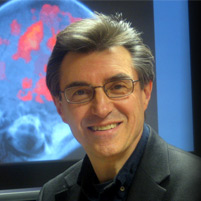Brains on Trial

Marcel Just
Brain imaging has the growing ability to separate truth from lies — and may radically affect criminal justice proceedings in the future.
Carnegie Mellon University's Marcel Just recently spoke about how brain research may play a role in courtrooms during part two of the innovative PBS series, "Brains on Trial with Alan Alda," which aired in September, 2013.
CMU's seminal neuroscience research combines brain imaging with machine-learning techniques to identify a person's thoughts and emotions. And the judicial process often includes not only what an accused person did, but also what he or she was thinking when they did it.
"Did the perpetrators fear for their life, had they premeditated their actions, did they feel remorse? These are all mental states that are on the verge of being identified via their brain activity signatures, at least at the time when the thought occurs," said Just, the D.O. Hebb University Professor of Psychology in the Dietrich College of Humanities and Social Sciences and director of the Center for Cognitive Brain Imaging (CCBI) at CMU.
"It remains a major challenge to identify a thought that occurred in the past. When that capability is developed, it will revolutionize forensic science. It will become 'CSI-fMRI.' This research opens a new world of possible evidence for assessing a person's responsibility for their actions," he said.
"Brains on Trial" centers around the trial of a fictional crime: a robbery staged in a convenience store that has been filmed by the store's security cameras. As the trial unfolds, Alda visits with leading neuroscientists whose research has begun to influence court decisions.
Just and his fellow CMU professors Tom Mitchell and Karim Kassam spent a day explaining and demonstrating their "mind reading" research to Alda, specifically how they use functional magnetic resonance imaging (fMRI) and machine learning to measure brain signals to precisely identify a letter a person sees and the emotion a person experiences.
Filming took place in CMU's Scientific Imaging & Brain Research (SIBR) Center, which uses cutting-edge imaging and computing technology in cognitive, developmental and social neuroscience research.
"I learned a shocking thing with Marcel because I really didn't understand the accuracy with which you can tell what letter a person is reading or what emotion a person is feeling by looking at the pattern of brain activity," Alda said. "It is just amazing that we're already at that point in brain science."
Alda, a seven-time Emmy Award winner, has a longtime interest in promoting a greater public understanding of science. He is a visiting professor at Stony Brook University's Alan Alda Center for Communicating Science, where he is helping scientists to communicate more effectively with the public in general and with legislators who influence science funding and policy.
Carnegie Mellon University has been a leader in the areas of brain science, psychology, and learning research for many decades.
Building on its foundation of research excellence in psychology, neuroscience and computational science, CMU recently launched a Brain, Mind and Learning initiative enhancing the university's ability to innovate in both the laboratory and in the world.
CMU is kicking off its yearlong "Crossing Boundaries, Transforming Lives" symposia with a discussion on brain research and its impact Sept. 28 from 10:45 AM — 12:15 PM in McConomy Auditorium, University Center. Topics will include what role CMU and Pittsburgh can play in President Obama's federal BRAIN Initiative and what new technologies and computational approaches we can help to create to improve our understanding of the brain.
The symposia celebrates Dr. Subra Suresh's inaugural year as the university's ninth president.
Related Links: Dietrich College of Humanities & Social Sciences | Dept of Psychology | Brains on Trial | Center for Cognitive Brain Imaging | Scientific Imaging & Brain Research Center | Brain, Mind & Learning at CMU | The Inauguration of Dr. Subra Suresh
